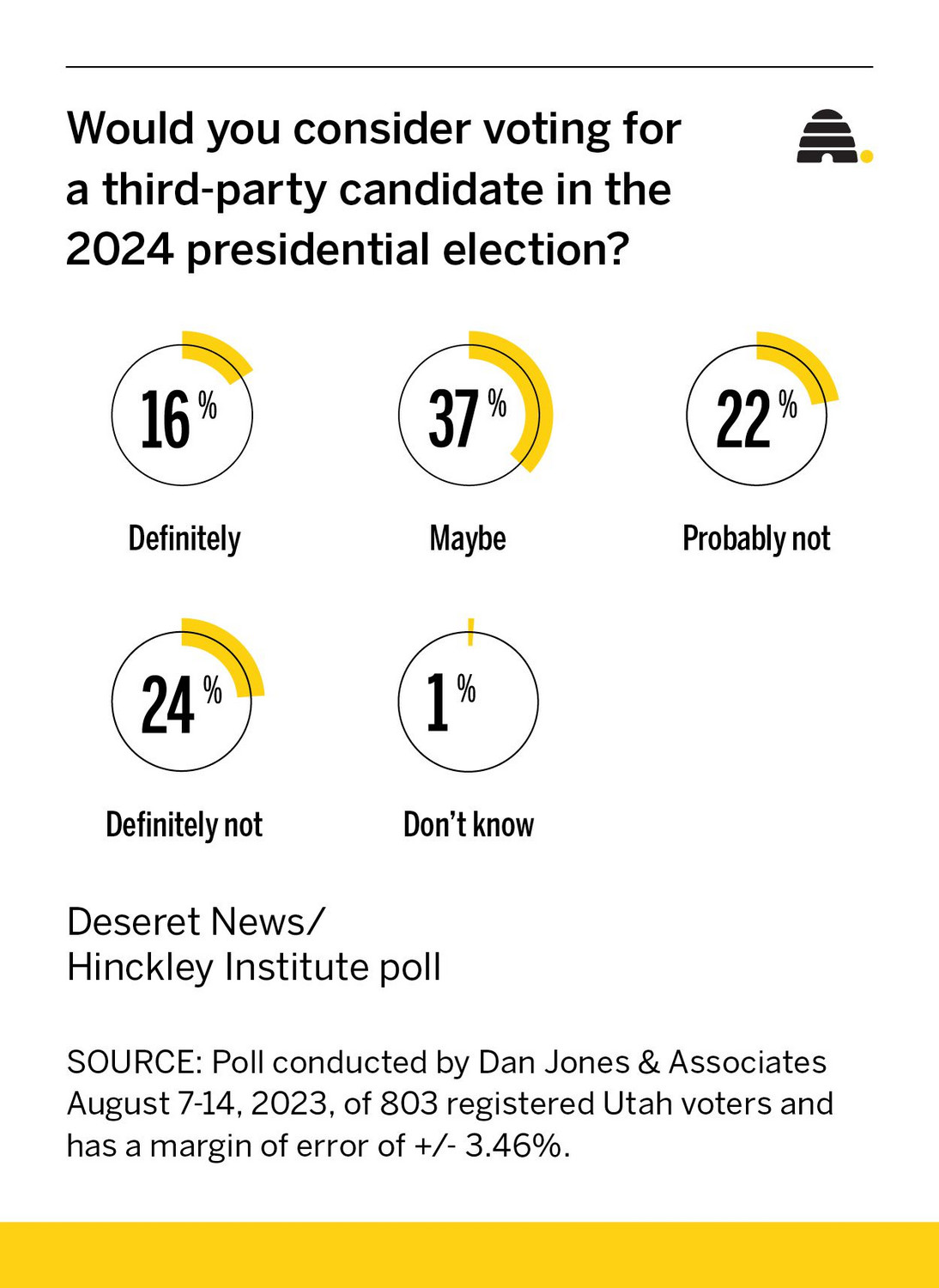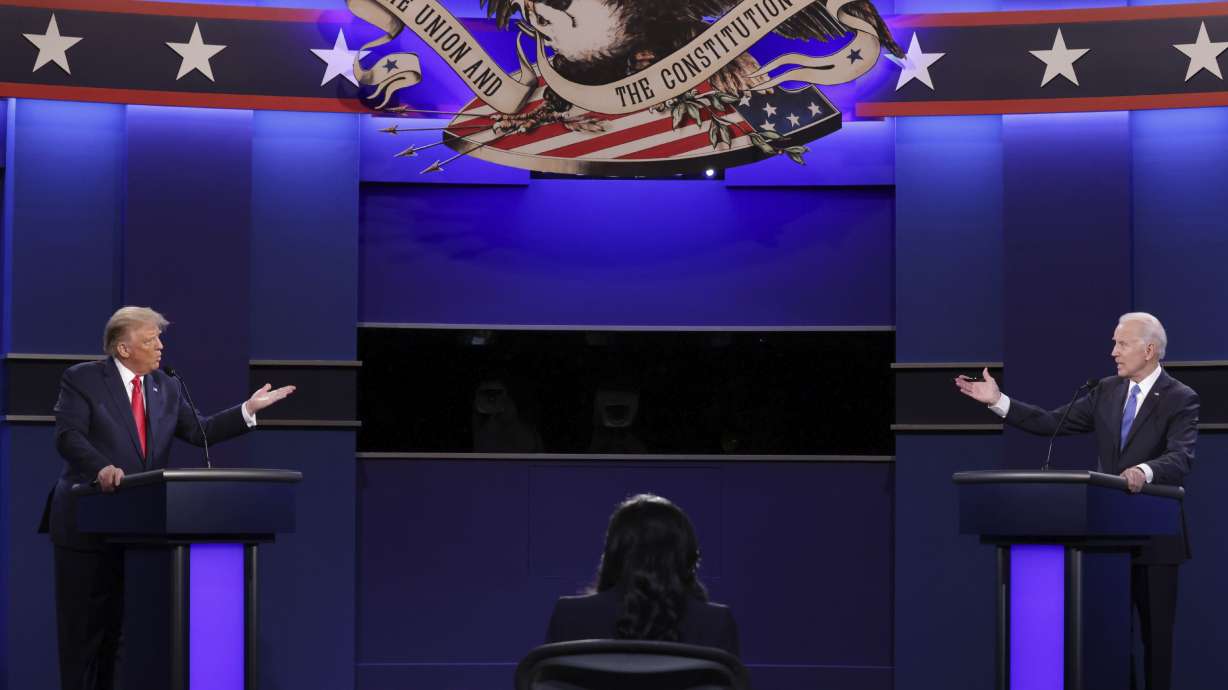Estimated read time: 5-6 minutes
This archived news story is available only for your personal, non-commercial use. Information in the story may be outdated or superseded by additional information. Reading or replaying the story in its archived form does not constitute a republication of the story.
SALT LAKE CITY — Ask any political science professor and they will tell you, America has a two-party system and little can be done about it. But what if the nation's two dominant political parties serve up presidential candidates disliked by a majority of the population?
Democratic President Joe Biden and former President Donald Trump, a Republican, appear to be the most likely nominees of their respective parties in 2024. And both are underwater by 19 percentage points in their net favorability ratings, according to a Wall Street Journal poll conducted at the end of last month.
The favorability ratings for Biden and Trump matched up exactly — both candidates received total favorable ratings of 39%, with unfavorable ratings of 58%. The same poll showed 73% of voters think Biden is "too old to run for President" and 58% think Trump is "corrupt."
With these relatively widespread and negative perceptions of the parties' standard-bearers, maybe it's no surprise that an NBC News survey conducted in April found 70% of respondents did not think Biden should run for president and 60% thought the same of Trump.
Enter renewed talk of third-party alternatives.
So far, the only prominent third-party candidate to enter the 2024 race is Cornel West, a progressive activist who previously taught philosophy at Harvard, Princeton and Yale, and who is seeking the Green Party's nomination.
But a nonprofit group focused on promoting bipartisan legislation in Washington, No Labels, has discussed introducing a unity presidential ticket as an "insurance policy" to "reset" the country in the case of a Trump-Biden rematch.
While the country's history has not treated third-party bids kindly, the group claims public opinion is on their side.
And according to a new Deseret News/Hinckley Institute of Politics poll, many Utahns seem open to the conversation.
A majority of respondents, 53%, said they would potentially cast their ballot for someone without an R or a D by their name in 2024, with 16% saying they would "definitely" consider voting for a third-party candidate in the next presidential election and 37% saying "maybe."
But with nearly a quarter of respondents saying they would "definitely not" consider a third-party ticket, and a fifth saying "probably not," for a total of 46%, the state is split down the middle on the issue.
The poll was conducted Aug. 7-14 of 803 registered Utah voters by Dan Jones & Associates, and has a margin of error of plus or minus 3.46 percentage points.

'Not at all enthusiastic'
Jason Perry, director of the University of Utah's Hinckley Institute of Politics, said while many people say they are willing to vote for a third party, they have "historically toyed with the idea then don't follow through with it."
"Third party candidates have traditionally had a very hard time," he said. "We saw our own experiment here in Utah with Evan McMullin in our Senate race last year, and while he came closer than a third party candidate has in the past, in the end, he was still not within 11 points of Sen. Mike Lee."
"We've not seen it work well in the state of Utah. But you never know in politics," he said.
But No Labels say they believe the presidential race this year presents a unique opportunity because of the low approval ratings of the two major candidates — a sentiment echoed by Chris Karpowitz, co-director of the Center for the Study of Elections and Democracy at Brigham Young University.
"These results represent yet another data point confirming that many voters are not at all enthusiastic about the prospect of a Trump-Biden rematch in 2024," said Karpowitz.
"However," Karpowitz pointed out, "there is a big difference between expressing openness to a hypothetical third-party choice at this early point in the campaign and actually voting for such a candidate in November of 2024."
Factors that make voting for a third-party candidate something of a rarity even in spite of dissatisfaction with the status quo include concerns voters have with particular third-party nominees as well as the strong influence of partisan allegiances, according to Karpowitz.
'The unanswered question'
This partisan influence is borne out when the poll is broken down by political ideology.
Only 31% of respondents who identified as "very conservative" were open to the idea of voting third-party next November, along with 41% of those who consider themselves "very liberal."
However, nearly three-quarters of self-described moderates, 74%, said they would consider voting for a third-party candidate in 2024, followed by roughly 60% of respondents who classified themselves as "somewhat conservative" or "somewhat liberal."
When sorted by age, the strongest support for the proposition appeared among those ages 25-40, with 66% of those respondents open to voting for a third-party. Those ages 41-56, on the other hand, had the highest percentage of "definitely not" at 42%.
The poll found women more willing to consider a third-party vote than men, 61% to 49%. But results across religious, educational and income categories were relatively consistent.
Utah showed a unique desire for a third way in 2016, Karpowitz said, when McMullin, this time as an independent presidential candidate, received more than 20% of the vote, with Hillary Clinton on the Democratic ticket and Trump on the Republican. But Trump walked away with an easy victory in the overwhelmingly red state.
"The unanswered question this time around," Karpowitz said, "is whether Donald Trump's many legal troubles are enough to alter that outcome. Could a third-party candidate muster enough support to take a plurality of the vote? Right now, that possibility still seems rather remote."
Contributing: Suzanne Bates








